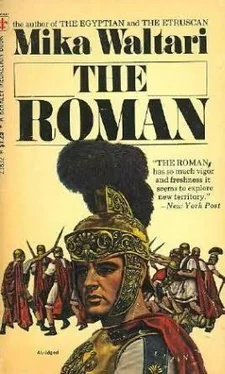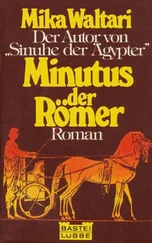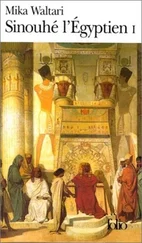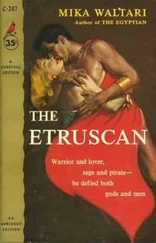Mika Waltari - The Roman
Здесь есть возможность читать онлайн «Mika Waltari - The Roman» весь текст электронной книги совершенно бесплатно (целиком полную версию без сокращений). В некоторых случаях можно слушать аудио, скачать через торрент в формате fb2 и присутствует краткое содержание. Жанр: Исторические приключения, на английском языке. Описание произведения, (предисловие) а так же отзывы посетителей доступны на портале библиотеки ЛибКат.
- Название:The Roman
- Автор:
- Жанр:
- Год:неизвестен
- ISBN:нет данных
- Рейтинг книги:4 / 5. Голосов: 1
-
Избранное:Добавить в избранное
- Отзывы:
-
Ваша оценка:
- 80
- 1
- 2
- 3
- 4
- 5
The Roman: краткое содержание, описание и аннотация
Предлагаем к чтению аннотацию, описание, краткое содержание или предисловие (зависит от того, что написал сам автор книги «The Roman»). Если вы не нашли необходимую информацию о книге — напишите в комментариях, мы постараемся отыскать её.
The Roman — читать онлайн бесплатно полную книгу (весь текст) целиком
Ниже представлен текст книги, разбитый по страницам. Система сохранения места последней прочитанной страницы, позволяет с удобством читать онлайн бесплатно книгу «The Roman», без необходимости каждый раз заново искать на чём Вы остановились. Поставьте закладку, и сможете в любой момент перейти на страницу, на которой закончили чтение.
Интервал:
Закладка:
Both the Consuls whom Nero had illegally dismissed took the chair and the Senate decided unanimously to appoint Galba, a bald and debauched old man who favored athletic lovers, as their new Emperor. Equally unanimously, the Senate declared Nero an enemy of the State and condemned him to death, in the way of their forefathers, by scourging. In this respect the Senate acknowledged that Nero was a senator with full rights, for a senator can be judged only by his equals. Everyone took it for granted that Nero would commit suicide to escape such inhuman punishment. Tigellinus was, of course, one of the most eager voters.
Nero awoke at midnight in the bedroom of his abandoned Golden Palace with his faithful “wife” Sporus in the other bed. Only a few slaves and freedmen were left in his service, and although he sent messages to his friends, not one of them sent him a reply, not to mention their support. To experience fully the ingratitude of the world, Nero set out on foot into the city with a few faithful followers, to knock vainly on the doors of some of the houses he had once lavishly presented to his friends. But the doors remained closed and not a word was heard from behind them in reply. For safety’s sake, the inhabitants had even bound the jaws of their dogs.
When Nero returned to the Golden Palace and his bedroom, he saw that it had already been robbed of its silken bedclothes and other valuable articles. He mounted and rode off barefooted, his head covered and he himself dressed in nothing but a tunic and a slave mantle, to a farm owned by one of his freedmen, which according to this man’s own story he had offered Nero as a hiding place. This villa lies by the via Salaria, at the side of the road near the fourth milestone. You will remember that Seneca spent the last day of his life in his house near the fourth milestone and that Cephas turned back to Rome by the fourth milestone on the via Appia.
Nero was accompanied by four men, Sporus, the freedman, surprisingly Ephaphroditus, and a man whom the Senate executed after he had been all too talkative in the forum. Acte was already at the villa, waiting for Nero. I thought the scene had been carefully set and was performed well. Nero was one of the finest actors of his time and set great store on staging, so that at the theater he was always remarking on a malplaced pillar or faulty lighting which emphasized a minor character while he was singing.
While he was on his way, there was an earthquake and lightning struck the road in front of Nero and his horse shied at the smell of a corpse and rose on its hind legs. Nero had covered his head, but when the horse reared the hood fell back and revealed his face. An ancient retired Praetorian happened to recognize him and greeted him as the Emperor. This increased Nero’s haste, for he feared his plan would be exposed too soon. This is all according to the testimonies of the freedman and Epaphroditus. Sporus later vanished without a trace and Otho never found him, although he would have gready liked to test his talents in bed. Otho also proposed to Statilia, relying on Nero’s experienced taste in these matters.
I do not wish to repeat everything these two men had to tell of Nero’s agony of mind, his terror and suffering; of how Nero drank by scooping water from a pool with his hands and plucked the thorns from his slave mantle after creeping through the bushes to the villa. Un-blinkingly they reported everything, to the considerable joy of the Senate and the historians. Nero had planned everything so carefully beforehand that he had even left behind a written speech in which he asked forgiveness for the crimes he had committed for political reasons and begged the Senate to spare his life and appoint him procurator in some modest Eastern province, for in his view he had served the Senate and the people of Rome well. In this way Nero created the impression of acting under the threat of death and being in the grip of blind terror. But these two eyewitneses could not have succeeded in convincing any reasonable listener. The only ones to be convinced were those who had done all they could to drive Nero to suicide and who therefore thought that their hopes had been fulfilled.
Nero remembered to leave posterity a magnificent retort as his last words: “What an artist the world is to lose in me.” These words I gladly emphasize, for not until much later did I realize what a master of the art of living and of the arts, yes, what a true friend of mankind Rome lost in Nero, however troublesome it was at times to be with him because of his capriciousness and conceit. But no one should hold unlimited power in his hands for seventeen years; remember that, my son, if you ever become impatient over your father’s sluggishness.
When the grave was dug, the marble blocks stacked around it, sufficient wood gathered and water brought to pour over the calcified marble, a messenger arrived from Rome with a letter for the freedman. From it Nero learned that Galba had been proclaimed Emperor and that he himself was to be scourged to death. The play was to continue, to give Sporus an opportunity for a widow’s hasty grief by the body, but an unexpected event forced the plotters to make haste.
The loyal veteran who had recognized Nero on the road did not hasten to report his flight, as any sensible man would have done, but instead rushed straight to the Praetorian camp on his trembling old legs. There everyone knew his scars and reputation and as a member of the Mithras brotherhood, he also had the centurions’ confidence. The moment was as favorable as possible, with Tigellinus still in the Senate where loquacious men continued to express their rage and their patriotic zeal, now they could for once talk without being interrupted.
The old man made a speech to his comrades and told them to remember their military oath and their debt of gratitude to Nero, as well as the weals Tigellinus’ stick had raised on their backs. Both the Praetorian legions practically unanimously decided to support Nero. They were certain of his generosity, while Galba was known as a miserly man.
They decided to meet force with force and never doubted the result of the battle, for they thought many legionaries would desert Galba if they saw Rome’s elite troops set against each other. Quickly they sent a cavalry troop under the command of a centurion to find Nero and bring him back to the safety of the Praetorian camp. But the men lost much time looking for Nero’s hiding place, for at first they did not think of the freedman’s distant villa.
But Nero had had enough of power. He sent his freedman to turn back the cavalrymen as soon as he heard of their errand. Then Epaphroditus stabbed him in the throat, practiced as he was in certain games to which Nero used to devote himself. Nero evidently chose suicide by a stab in the throat in order to convince the Senate that he sacrificed even his vocal chords, so that no doubt should arise over his death. If later another great singer was to gain fame in the East, no one would even think of Nero, for it would be known that he had cut his own throat
As the blood artistically welled up from the wound, Nero, with the last shreds of his strength, received the centurion, in a broken voice thanked him for his loyalty, then turned his eyes upward and died with such a credible rattling and jerking that the seasoned centurion, tears in his own eyes, covered his face with his scarlet centurion mantle so that Nero should die in the way of Emperors, with his face hidden. Julius Caesar, too, covered his head to honor the gods when the assassins’ daggers riddled his body. Nero’s freedman and Epaphroditus now told the centurion that, for his own sake and that of all loyal Praetorians, it would be wisest to return to the camp with the news of Nero’s death, so that no one would do anything foolish. Then he should hurry to the Senate and say that in the hope of a reward he had followed Nero to capture him alive and hand him over to the Senate, but that Nero had managed to take his own life.
Читать дальшеИнтервал:
Закладка:
Похожие книги на «The Roman»
Представляем Вашему вниманию похожие книги на «The Roman» списком для выбора. Мы отобрали схожую по названию и смыслу литературу в надежде предоставить читателям больше вариантов отыскать новые, интересные, ещё непрочитанные произведения.
Обсуждение, отзывы о книге «The Roman» и просто собственные мнения читателей. Оставьте ваши комментарии, напишите, что Вы думаете о произведении, его смысле или главных героях. Укажите что конкретно понравилось, а что нет, и почему Вы так считаете.











